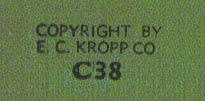 |
| c. late 1940s to early 1950s |
The publisher—
 The humor in the "Wall Street" joke might come from the 1920s boom: everyone—but everyone—is getting into The Market, could be one read.
The humor in the "Wall Street" joke might come from the 1920s boom: everyone—but everyone—is getting into The Market, could be one read. The vivid color seems to be post-World War II; compare with a wartime card from the same company—
 |
| "Milwaukee, WI: E. C. Kropp... Back of postcard is postmarked 1942." [Card and notes found here.] |
The country truly was "all out" for defense in the 1940s, with the war effort and beginning of economic recovery taking precedence in daily life. While I suspect Wall Street wasn't much of a presence in the public mind, it was there right after the war was won: part of the setting for ticker-tape parades.
From the Metropolitan Postcard Club of New York City is this entry in the list of publisher names starting "K"—
E. C. Kropp Co. 1907-1956This Kropp novelty card, too, is printed very nicely on linen card—which seems a bit incongruous for such a silly gag.
Milwaukee, WI
A publisher and printer that began producing chromolithographic souvenir cards and private mailing cards in 1898 under the name Kropp. These cards were of much higher quality than those that would printed under the E.C. Kropp name.
They became the E.C. Kropp Company in 1907 and produced large numbers of national view-cards and other subjects. Their latter linen cards had a noticibly fine grain. Sold to L.L. Cook in 1956 and they are now part of the GAF Corp. U.S.
Though I'm not completely sure of the joke's intent.
On "Wall Street" we have two dogs at a lamp post—a prop leading to canine reaction, create "pool"...
While I suppose it was meant as a naughty joke about doggie
leg-lifting, the gag also seems to have a negative undertone about Wall Street.
During the late 1940s-50s, Americans were still close enough to the Depression for many people to have a negative image of Wall Street and big business; this, after all, was the reason post-war corporations put so much effort into turning their public images homey and friendly.
Well, I choose to see the Kropp card as an unflattering comment about Wall Street. And indoctrinated as Americans may have become in the decades since this was printed, things have always been about class warfare. Which is increasingly in our faces; for example here, and here.
Whether criticism of unregulated capitalism is labeled "class warfare," or the mass media treat protest as something done by clueless hippies: the reality in our current, unacknowledged economic depression is more like this.

No comments:
Post a Comment